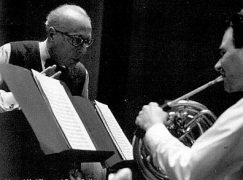George Szell: I was described as the new Mozart
Daily Comfort ZoneThe Cleveland conductor gives a spellbinding interview to John Culshaw.

The Cleveland conductor gives a spellbinding interview to John Culshaw.
There were protests during Christmas mass at Freiburg…

From the Berliner Zeitung: …How dangerous real music…

The Raiders of the Lost Tomb version. It’s…

A tenor who was audibly below par, an…

Session expired
Please log in again. The login page will open in a new tab. After logging in you can close it and return to this page.
It’s worth a listen. He was a monster on the podium, but in interviews we was quite engaging and honest (the ones with Paul Myers are also quite good).
And in fairness to Szell, he’s pretty self-deprecating in the interview about the early praised he received as a child pianist and composer.
Well, George – Mozart wasn’t the nasty bastard that you were.
We were fortunate he was…..
I admire Szell’s work immensely and am so grateful for the Sony box of his complete recordings…what a stunning legacy. It saddens me that I was just too young to ever hear him live. He may have been a total martinet and no doubt couldn’t work in today’s world, but who wouldn’t make a Faustian bargain nowadays to have someone of his caliber around? Even with music he didn’t care for he turned in first-class performances. He famously called the Tchaikovsky 1st piano concert “a piece of sh*t”, then made that brilliant recording with Graffman. What’s always puzzled me is that despite is extraordinarily high standards for his conducting students (there are more than he mentions in the video) only one of them rose to greatness: James Levine. Several times a year I head out on horseback and go camping near the Whetstone Mountains some 60 miles SE of Tucson. Nearby there’s a teeny town, Elgin, that is largely forgotten. But decades ago there was a medical facility, now we’d call it a re-hab center, where Szell’s step-son spent some time, and Szell and wife would visit from time to time. I think of Szell everytime I go out there: here’s this world-famous, great conductor who had worked in the musical capitals of the world. What in the world did he think of Elgin and surrounding area? I’ve tried to locate people who worked there at the time and see if anyone remembered him but so far no luck.
Re: Levine, that’s the very diametric opposite of “garbage in, garbage out.”
Szell seemed to have a better knack for identifying young musicians than conductors. There are a lot of famous names he’s associated with: Lynn Harrell, Arnold Steinhardt, Myron Bloom, Leon Fleisher, etc. And they were so young at the time, that until several years ago, many were still alive.
And he certainly didn’t have anything to teach Boulez, but he recognized his talent and gave him a platform to launch his conducting career in the U.S.
Karajan had the same interested for young artists he could influence more than sacred monsters, Mutter, Kissing, Mesenes….
Wyn Morris worked out well when sober.
Sorry, but there was only one Mozart. Mendelsohn was also often claimed to be his successor but his music is not comparable (although good in its own way).
GS was a great, great conductor but not Mozart-like. Sorry.
First, Szell never claimed to be the new Mozart, it was a headline in the newspaper. Second, it didn’t refer to his ability to compose, although as he indicated he composed a few pieces as a child, but rather his facility both playing the piano and improvising on the spot. Last, his realization that his compositions were of limited quality was demonstrated when Louis Lane started to play, at the piano, an overture he wanted to include in a future program with TCO, and Szell immediately stopped him when he realized it was one of his pieces and indicated it was best forgotten.
Fascinating interview! How amazing to have in Berlin at the same time Kleiber senior, Walter and Klemperer with Szell also prominent under Kleiber. That Strauss had in Szell’s view conducted the most perfect Cosi he had heard is equally fascinating to one who knew little about Strauss on the podium other than he was sometimes keen to get the performance over quickly to get to his regular card game.
Then there are his comments on Rudolf Bing’s lack of preparation for Figaro at the Edinburgh Festival and later Tannhauser at the Met which resulted in Szell walking out. This rather puts a dent in Bing’s reputation as an opera manager!
Never too late to discover the Mozart’s records he did with Cleveland. Especially. The new box about him in Cleveland is extraordinary. Same thing for the few records he did with the Concertgebouw. The LP about Sibelius 2 is for me one of the best ever done. The one with the bird on the cover.
That glorious 8D!
Dear ‘Horn geek’, how does this relate to Szell’s interview? please elucidate.
I could never stand this narcissistic sociopath.
Knew him well, did you? I hope you never had to deal with Reiner, then!
There are a number of pejorative labels that unfortunately can be used in conjunction with the professional George Szell but monstrous (comment above), narcissistic and sociopath aren’t among them. His attire was always meticulous but never flashy and his podium demeanor understated so I don’t know where you pulled narcissistic from. As for being a sociopath that would require a clinical diagnosis I doubt you are qualified to render and/or evidence from unbiased acquaintances. Overly demanding, occasionally bullying, inflexible and self-assured in musical matters have all been used to describe him as well as supremely knowledgeable, self-critical, thoroughly prepared, analytical, occasionally generous and serious minded. I was hoping that Michael Charry had been afforded the opportunity to discuss Szell the man more in his biography but I assume his editor thought otherwise. No one moment in anyone’s life is necessarily defining but I would suggest that Szell’s comments to the audience in Severance Hall regarding the Kent State massacre and the performance of the Beethoven Eroica that followed are more indicative of the man than how you have chosen to portray him:
https://www.youtube.com/watch?v=VGjF5mWYnHo
Did you actually know him? I worked for TCO in the late 50s-early 60s. Yes, he was an autocrat, but for good reasons. He studied in depth the original scores of the composers he conducted. He expected the highest performances standards from each of his orchestra members – which he got! TCO went from a good American orchestra to a top-notch, world-renowned orchestra. To those orchestra members who found working under him objectionable, I said, “If you can stand the heat…”. Some did leave. But those who stayed knew they were a part of something great. And those orchestra members who worked under Szell improved their own musicianship as a result of his scholarly, disciplined approach. There are many ways to skin a cat. His way brought TCO to the pinnacle of musical success. May he RIP.
A teenager in the 50s, I was week-after-week seeking autographs of CleveOrch soloists. This took me practically into Mr. Szell’s dressing room. He never seemed to object to my nagging presence. Once, he said he’d found an autograph on the floor and ask if I’d dropped it. Was not the monster he was reputed to have been.
Excellent interview. I’ve just been reviewing Michael Charry’s Szell bio (a bit worshipful) and ‘Tales from the Locker Room: An Anecdotal Portrait of George Szell and his Cleveland Orchestra’, so this was a welcome bonus.
I grew up in Cleveland was a great admirer of George Szell. If it were not for your website I would have not have had any idea that such an interview existed